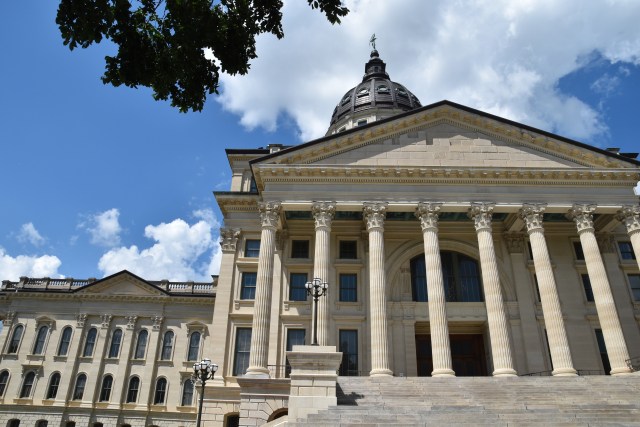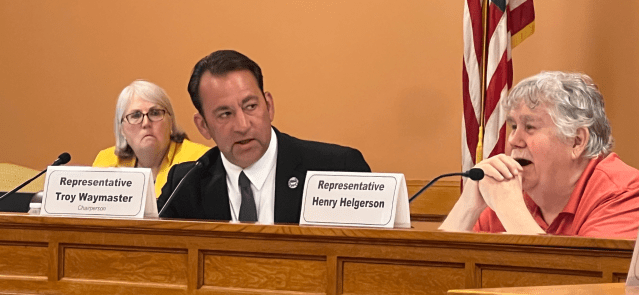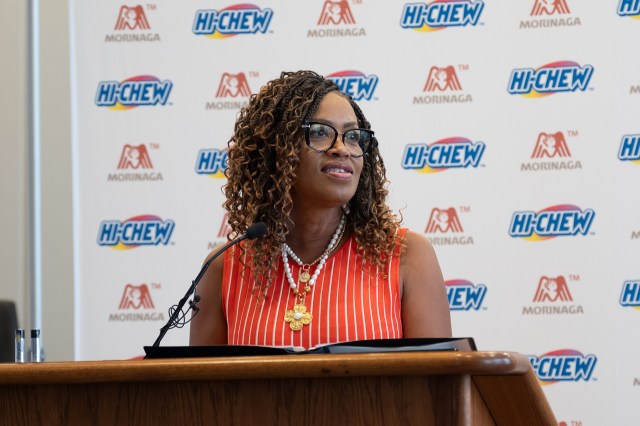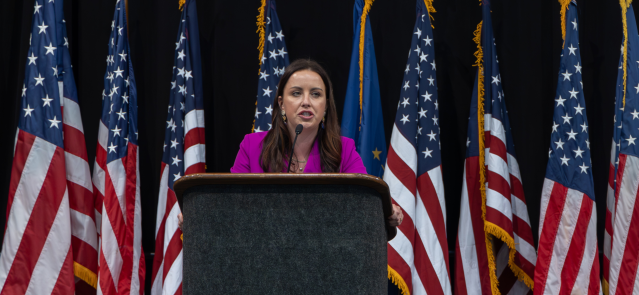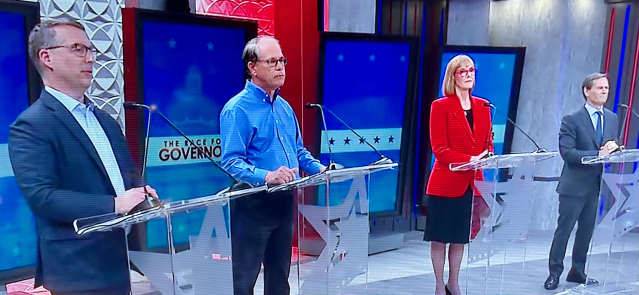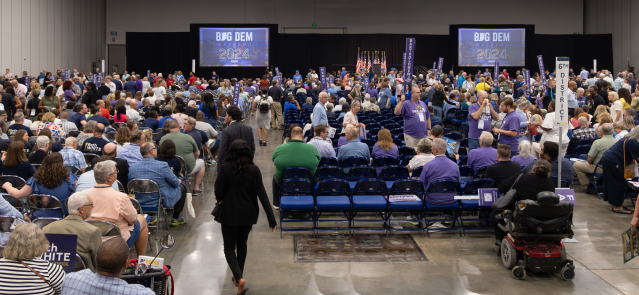Stay ahead of the curve as a political insider with deep policy analysis, daily briefings and policy-shaping tools.
Request a DemoGallego Calls on Menendez to Resign
Sinema Introduces Bipartisan Bill Protecting Personnel & Infrastructure from Extreme Heat and Weather Along the Southwest Border
Attorney General Mayes Leads Coalition Advocating for FEMA to Address Extreme Heat and Wildfire Smoke
PHOENIX – Attorney General Kris Mayes today led a coalition of 14 attorneys general in petitioning the Federal Emergency Management Agency (FEMA) to initiate rulemaking to update its regulations to recognize extreme heat and wildfire smoke events as eligible for major disaster declarations under the Stafford Act. The petition also seeks to clarify that wildfire smoke events are eligible for Fire Management Assistance Grant (FMAG) funding.
In their letter addressed to FEMA Administrator Deanne Criswell and Chief Counsel Adrian Sevier, the attorneys general highlighted the increasing frequency and severity of extreme heat and wildfire smoke events due in part to climate change. The letter explains that such events pose significant public health risks and financial burdens on local communities, which may require federal assistance to effectively respond to these disasters. “Extreme heat and wildfire smoke events are devastating because of their severe impact on public health and the environment, yet they are not currently recognized as major disasters by FEMA,” said Attorney General Mayes. “Updating FEMA’s regulations to include these events will provide much-needed resources and help us better protect our residents.” The letter detailed the significant impacts of recent extreme heat and wildfire smoke events, citing examples such as the 2021 Pacific Northwest Heat Dome, which resulted in hundreds of deaths and widespread power outages, and the Canadian wildfires that blanketed parts of the Midwest and East Coast in smoke. The attorneys general underscored the importance of proactive measures and federal support in mitigating the effects of these disasters. “In 2022, Arizona recorded 1,030 deaths related to or caused by heat statewide, as well as over 4,000 hospital or emergency room visits for heat-related illness,” added Attorney General Mayes. “These preventable deaths are occurring both inside and outside, highlighting the need for things such as additional LIHEAP funding for low-income customers to receive assistance with their utility bills, more data-driven, 24-hour cooling centers, and better worker protections for extreme heat and wildfire smoke. Arizona is also in a long-term drought, which increases wildfire hazards exponentially.” The letter explains the urgent need for FEMA to amend its definition of “major disaster” to explicitly include extreme heat and wildfire smoke events. It also emphasizes the critical role of Fire Management Assistance Grant (FMAG) funding in addressing the health impacts of wildfire smoke, such as providing HEPA air filtration devices and other necessary supplies to vulnerable populations. Additionally, the letter highlights the projected increase in frequency and severity of these events, stressing the necessity for a more robust and adaptive federal response. In sending today’s letter, Attorney General Mayes was joined by the attorneys general of California, Colorado, Connecticut, the District of Columbia, Illinois, Massachusetts, Maryland, Michigan, New Jersey, New Mexico, New York, Oregon, and Vermont. A copy of the letter is available here.Statehouse Briefs: Whisman tapped for high-ranking lobbying post; Schmidt surpasses state’s congressional fundraising record
Katie Whisman, a former 18-year veteran of the Kansas Bureau of Investigation, was recently named to a lead role within the lobbying arm of Husch Blackwell Strategies, a multi-jurisdictional governmental affairs agency.
Whisman, based out of the agency’s Topeka office, will primarily focus on the Legislature.
In addition to her time with the KBI, Whisman has previous experience in the lobbying arena as the sole practitioner of a specialized firm. Husch Blackwell Strategies CEO Andy Blunt lauded Whisman as an “impressive force in Kansas government affairs” while also highlighting her background as an experienced investigator.
“Her devotion to getting the job done in the most complicated of circumstances will benefit our clients and represents our commitment to having best-in-class professionals in our 12 offices across the country,” Blunt said in a news release.
Whisman, according to the release, became the first woman elevated to the rank of KBI special agent in charge — while also managing the KBI’s Office of Government Affairs and serving as the principal adviser to the director and executive staff for legislative affairs. In addition, Whisman garnered acclaim for work centered on the formation and management of a statewide multidisciplinary working group for the Kansas Sexual Assault Kit Initiative.
Matt Hickam, managing director of Husch Blackwell Strategies Kansas, called Whisman “the real deal.”
“She has established herself as an accomplished legislative negotiator who lawmakers count on to get things done in Topeka,” he said.
Schmidt grows war chest, Kahrs gains endorsement
In his quest for Kansas’ 2nd Congressional District seat, former three-term Attorney General Derek Schmidt announced late Monday that he raised $430,000 during the first quarter of his campaign. According to a news release from Schmidt’s campaign, the sum represents the largest total raised by a first-time congressional candidate in state history.
“Our team has been overwhelmed by the outpouring of support on such short notice in this campaign,” Schmidt said in the release. “We look forward to a strong showing in the [Aug. 6] primary, and to keeping this seat in Republican hands come November.”
The seat is up for grabs after two-term Republican U.S. Rep Jake LaTurner announced in May his intention of departing Congress at the conclusion of the legislative session. Schmidt has been absent from the political arena since his loss to incumbent Gov. Laura Kelly in 2022.
In related news, 2nd Congressional District candidate Jeff Kahrs nabbed an endorsement from Family Research Council, according to a recent announcement on his X page. Family Research Council is a Washington, D.C.-based think tank that touts itself as a “pro-marriage and pro-life” organization. The nonprofit endorses candidates who exude values related to “family, faith and freedom.”
“Your commitment to our shared values means you will speak up on behalf of the unborn, strong families, and religious freedom,” read the endorsement letter posted to Kahr’s X page.
Schmidt and Kahrs have also picked up endorsements from the Kansans for Life PAC, the political wing of the state’s leading anti-abortion advocacy group. And more recently, Schmidt secured a coveted endorsement from the National Rifle Association Political Victory Fund.
Correction: This story has been updated to provide the correct spelling of Matt Hickam’s name.
Matt Resnick is a statehouse reporter at State Affairs Pro Kansas/Hawver’s Capitol Report. Reach him at [email protected].
Build Kansas committee says cities must contribute to projects
Entities seeking state money for infrastructure projects must commit to their own matches or provide a solid reason why they can’t, the Build Kansas Advisory Committee said Tuesday.
The committee didn’t specify a required amount of support, but the match can be monetary or in-kind. Rep. Troy Waymaster, R-Bunker Hill, said the committee should be more critical of what it approves.
“We are the stewards of the $200 million that we’re going to be allocating for the next four years,” the committee chairman said. “We don’t want to over-exhaust that. We want to be prudent.”
Waymaster said entities would need “a pretty detailed explanation” if they determine they can’t provide support for the projects.
“More than, ‘We just don’t have the funds,’” he said. “Anybody can say that.”
The committee last month said it wanted to explore additional parameters to guide decisions on the Build Kansas Fund, which has $200 million in state-matching dollars available for state agencies, cities, counties, special districts, community and nonprofit organizations, and federally recognized tribes.
Entities are required to provide a 10% to 25% match depending on the federal grant program.
The committee on Tuesday approved about $1.4 million for 13 projects, including four six-figure requests:
- Coffeyville — $446,500 to enhance walking and biking accessibility (the committee reduced the request by 5%)
- Clay Center — $318,750 for a storm shelter attached to the city’s community center
- Osage County — $148,634 for a new transload facility
- Flint Hills Metro Planning Commission — $119,670 for regional trail and transportation improvements in the Manhattan area
The committee rejected the largest and third-biggest requests for funding.
Dodge City didn’t receive $354,000 for a highway-rail grade crossing improvement project because the city mentioned in the application that it had a money source if the committee didn’t approve state funds.
The committee also rejected Topeka’s request of $3.3 million for its application to create bikeways in 10 roadway corridors around the downtown core.
Rep. Kyle Hoffman, R-Coldwater, said he wanted to see Topeka share some of the cost because the city is “big enough” to provide a match. He added, “I’m not sure this money is really made for bike lanes.”
Sen. Usha Reddi, D-Manhattan, pushed back against the assertion that bike lanes weren’t a proper use of money.
“When we just look at bike lanes and say, ‘That’s not what transportation money is for,’ I think we’re not looking at it in a comprehensive manner,” she said.
The committee later agreed it would give money from the Build Kansas Fund if the Topeka government provided a match.
The Kansas Infrastructure Hub, a group that distributes Bipartisan Infrastructure Law funds, manages the fund, which will expire June 30, 2027, unless all money is committed sooner.
Matthew Volz, representing the infrastructure hub, presented how much of the $200 million has been used.
The committee, including Tuesday’s actions, has approved $125.5 million since October, although much of that amount is pending federal grant approval.
The state has committed $22.6 million after nine projects gained federal approval. Of that total, $20 million is devoted to one project — Dodge City’s upgrade to its water treatment infrastructure to help replenish the Ogallala Aquifer.
The federal government rejected seven projects that called for about $34.15 million.
“We’re not going to win everything, that’s for sure,” Volz said.
Bryan Richardson is the managing editor at State Affairs Pro Kansas/Hawver’s Capitol Report. Reach him at [email protected] or on X @RichInNews.
Japanese candymaker to invest $136 million in Mebane expansion
Officials ranging from county commissioners to members of Congress gathered in Hillsborough on Tuesday to celebrate the expansion of a Japanese confectionery company’s Orange County operations.
Commerce Secretary Machelle Baker Sanders said Morinaga America Foods, Inc., will expand its current operations in Mebane, investing $136 million and creating more than 200 jobs. Morinaga America’s parent company opened the Mebane facility — its first outside of Asia — in 2015 to produce its popular HI-CHEW candy, Sanders said.
“More candy, more jobs. What better setup is that?”
The company received a performance-based grant of $100,000 from the One North Carolina Fund to facilitate the expansion, contingent on an investment of $115.4 million and the creation of 40 jobs. The average salary for those tracked jobs will be $67,075, according to a news release from the office of Gov. Roy Cooper.
“Over the past few years, we have had and seen unprecedented growth from our Japanese business partners,” Sanders said. More than 30,000 North Carolinians go to work every day at one of the 225 Japanese-owned companies operating in the state, she said.
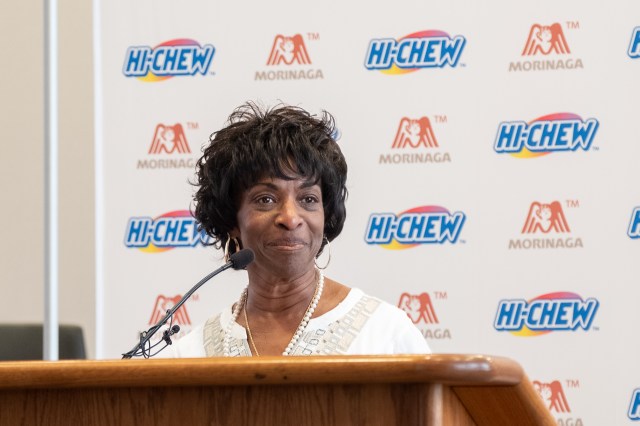
U.S. Rep. Valerie Foushee said she remembers county staffers laying the groundwork for economic growth during her time on the Orange County Commission, and that during negotiations to open the Mebane plant Morinaga had promised to add more jobs later.
“True to that promise, here we are today talking about an additional 204 jobs,” Foushee said.
The news release from Cooper’s office noted that since he and Sanders led a North Carolina delegation to an economic development conference in Tokyo in 2023, Japanese companies have announced 4,379 new jobs in the state. Those companies include Toyota, Fujifilm Diosynth, Dai Nippon Printing, Kyowa Kirin and Morinaga.
“North Carolina continues to attract large investments from companies in Japan because we offer the advantages they look for,” Cooper said in the news release. “It was great to visit with Morinaga’s leadership when I was in Japan and it’s clear that the relationships we’ve made, along with our great workforce, infrastructure and quality of life, continue to bring good jobs to our state.”

In April, Cooper hosted Japanese Prime Minister Fumio Kishida. In October, the Southeast U.S./Japan Association economic conference will be held in Charlotte.
Sen. Graig Meyer, D-Orange, said the Legislature seeks economic development opportunities large and small. “This is a great example of an international partnership that does play out in a small town, in a small area,” he said. “It’s a lot of jobs for a very small part of Orange County.”
Looking ahead, the hope is to see economic growth expand into all parts of the state. “The I-40 corridor between the Triangle and the Triad is going to fill up with amazing business opportunities,” he said. “We hope that will spur economic development along the Virginia border where we’ve got some relatively struggling counties. They can get the benefit of the roll off.”
For questions or comments, or to pass along story ideas, please write to Clifton Dowell at [email protected] or contact the NC Insider at [email protected] or @StateAffairsNC on X.
Wells lambasts Rokita’s rhetoric after Trump assassination attempt
Democratic attorney general nominee Destiny Wells on Tuesday criticized Indiana Attorney General Todd Rokita for posting what she considered vitriolic rhetoric immediately after a failed assassination attempt on former President Donald Trump.
Rokita, in a Sunday X post, blamed Democrats, the media and “the establishment in this nation including in Indiana” for encouraging violence.
“As a cabal, they will go to any lengths to silence the speech of those who won’t go along with their narrative — starting with intimidation, lawfare, workplace cancelation, and ultimately deadly violence,” Rokita wrote in the post, in which he also offered his condolences to victims of the assassination attempt.
During a Tuesday news conference, Wells criticized Rokita’s response, calling him a “one-trick pony” who “doesn’t know how to turn it off.”
“Nationally, there was a call to turn down the temperature because we know what was at stake,” Wells said. “Immediately Todd Rokita started messaging a lot of vitriol about the assassination attempt and trying to blame Democrats.”
Following the news of the attempted assassination, many Indiana politicians, including Republicans and Democrats, issued statements condemning political violence. Wells called for Rokita to join others in “turning down that temperature and sticking with the issues.”
Brent Littlefield, Rokita’s campaign adviser, told State Affairs that Wells “failed to read the room when the state of Indiana rejected her and her office she tried to run for 24 months ago.” He said Indiana was uninterested in her “extreme policies,” which he said reflect President Joe Biden’s agenda.
Wells ran an unsuccessful bid for secretary of state two years ago against Republican Diego Morales, whom she lost to by nearly 14 percentage points.
On Saturday, Wells bested former Marion County Clerk Beth White to secure the party’s attorney general nomination. Wells will challenge Rokita, who has faced a misconduct reprimand from the state Supreme Court and other ethics investigations, for the state attorney general position in November.
At the Indiana Democratic Convention, Wells assailed Rokita as a flawed candidate focused on seeking appearances on Fox News with actions such as his pursuit of sanctions against Dr. Caitlin Bernard after she provided an abortion to a 10-year-old Ohio rape victim.
As attorney general, Rokita, a staunch Donald Trump supporter, has spearheaded legal fights over “sanctuary” cities, terminated pregnancy reports, insulin prices and more.
Wells seeks to be the first Democrat to win a statewide election in Indiana since 2012, when Glenda Ritz was elected superintendent of public instruction and Joe Donnelly won a U.S. Senate seat.
But to do so, she must overcome Rokita’s campaign funding advantage. Rokita’s campaign had amassed more than $1.3 million by June 30, the end of the latest reporting period. Wells’ campaign had collected nearly $100,000; however, she expects to raise more money now that she has secured her party’s nomination.
“I have been on the horn for the last two days, having those conversations with donors who were holding out to wait to see who would win the convention race,” Wells said. “I think, after we won decidedly, we are seeing that money start to come in.”
Contact Jarred Meeks on X @jarredsmeeks or email him at [email protected].
Chambers, Doden topped Braun’s spending in $48M Republican race
U.S. Sen. Mike Braun’s wide victory in the Republican gubernatorial primary came even as he finished third in campaign spending for the race.
State campaign finance reports filed this week and reviewed by State Affairs show Braun spent nearly $11.8 million between launching his bid for governor in late 2022 and the June 30 end of the reporting period.
Some of Braun’s spending occurred after he won the six-candidate primary on May 7 with 39.5% of the vote, but that total is still less than spending reported by Brad Chambers and Eric Doden.
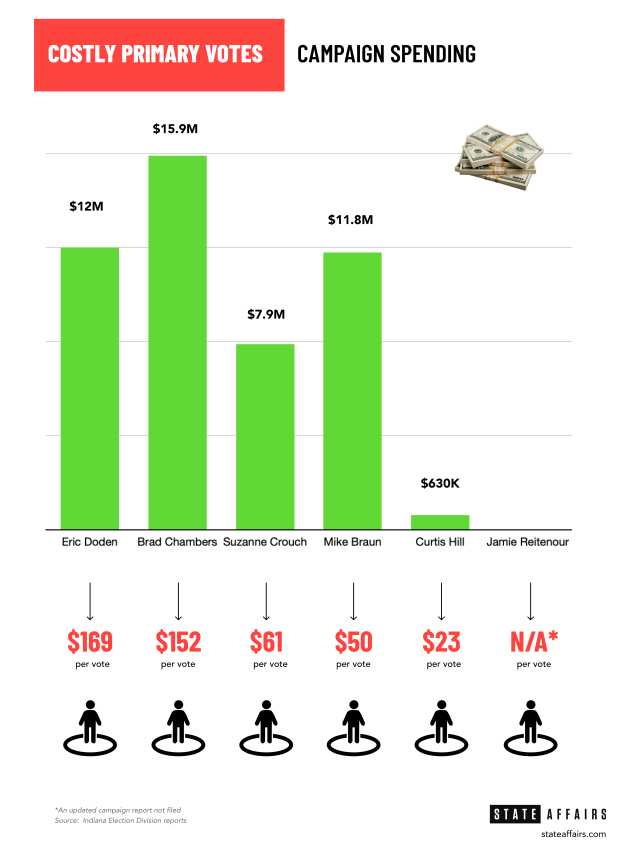
Among the Republican candidates:
- The Chambers campaign led the pack by spending nearly $15.9 million as he tried to build name recognition after stepping down as Gov. Eric Holcomb’s commerce secretary and entering the governor’s race in August 2023. The founder of real estate developer Buckingham Cos. made $10.5 million in loans to his campaign, including $500,000 four days before the primary. Chambers finished third in the primary with 17.5% of the vote.
- Doden’s campaign spent just shy of $12 million on the race that the Fort Wayne businessman started in 2021. About $7.7 million of Doden’s campaign cash came from his parents, with $3 million recorded as loans on his state report. Doden finished fourth in the primary with 11.8% of the vote.
- Braun seeded his run for governor with a $900,000 transfer from his U.S. Senate campaign account in December 2022. But he did not make any personal campaign contributions after fueling his successful 2018 Senate campaign with more than $11 million in personal loans. Braun’s gubernatorial campaign has raised more than $1.25 million in large contributions of at least $1,000 since the May 7 primary heading into the general election against Democrat Jennifer McCormick and Libertarian Donald Rainwater.
- Lt. Gov. Suzanne Crouch reported spending $7.9 million since the beginning of 2021 as she built her campaign that she formally entered in December 2022. Crouch finished second in the primary with 21.7% of the vote.
- Former Attorney General Curtis Hill reported spending $630,000 since entering the governor’s race in 2023. He came in last among the six candidates with 4.6% of the vote.
- The state Election Division website did not show, as of midday Tuesday, that Jamie Reitenour had filed an updated campaign report, which was due Monday. Her last report through the end of March brought her total spending to about $70,000. Reitenour finished fifth in the primary with 4.8% of the vote.
The total spending of about $48 million in seeking the Republican nomination was “amazing,” said Paul Helmke, an Indiana University civics professor and former Republican mayor of Fort Wayne.
Braun entered the governor’s race as the best-known candidate, and the heavy spending by Chambers and Doden to build their name identification never changed the overall dynamics, Helmke said.
“The challenge it shows is that when you’re in a crowded race, money probably means even less, because it’s just hard to break out of the pack,” he said. “In effect, they were all spending money to become the alternative to Braun and you’re splitting those votes too many ways.”
Tom Davies is a Statehouse reporter for State Affairs Pro Indiana. Reach him at [email protected] or on X at @TomDaviesIND.
Most Hoosier Democrats still back Biden
Many Hoosier Democrats appear to be content with President Joe Biden remaining atop the Democratic national ticket.
At Saturday’s state convention, a unanimous resolution backing the Biden-Harris ticket was passed a little less than three weeks after President Biden’s first debate performance was widely dubbed a disaster. That set in motion calls from some pundits and party members in Congress for Biden to step away from his second nomination.
In a series of interviews State Affairs/Howey Politics Indiana conducted at the Indiana Democratic Convention ( before the assassination attempt on Republican nominee Donald J. Trump), most Democrats appeared content to keep the 81-year-old president at the top of the ticket, though several backed a change in the nominee or the messaging.
Democratic gubernatorial nominee Jennifer McCormick told State Affairs/Howey Politics Indiana: “I know there’s a lot of decisions to be made. The biggest thing is he’s been a very successful president, but we want him to take care of his own health. It’s a very personal decision to make with his family and health care provider. Regardless of who lands in that position, we’re going to support them.”
State Rep. Vernon Smith, D-Gary, said the Indiana Black Legislative Caucus still stands with the Biden-Harris ticket. “We’ve got to be united. We’ve got to come together,” Smith said. “If not, we’re going to fall. But we don’t communicate our message. We don’t get it out. We’ve got the power. We’ve got to fight. We can’t quit.”
State Sen. Fady Qaddoura said, “The atmosphere at this convention is clear: The Indiana Democratic Party is behind President Biden. I can’t speculate on a national level, but I think the Indiana delegation is going to support President Biden. They look at the alternative, which is Donald Trump. He brings a lot of concerns to a number of constituencies across Indiana. We don’t need a president who promotes chaos and fear.”
The Indianapolis Democrat added, “There are policy concerns from his first presidency. He was able to impact the Supreme Court, which interrupted reproductive rights.”
House Minority Leader Phil GiaQuinta, D-Fort Wayne, praised Biden and his administration for doing “a wonderful job for this country.”
“He’s going to lead the ticket, and when he does, I’ll be fully behind him. When you look at all the metrics on the economic side, it’s going crazy. To rebound from COVID when he took office, he and his team have done a wonderful job. We should be way ahead of somebody who’s been convicted of all these felonies,” GiaQuinta said.
Political operative Jeff Harris that there is “a lot” of angst about Biden. “… But he’s our nominee. I don’t see there’s a path to change that. You can feel that in the rooms of the state convention here. There’s a tremendous amount of support here for President Biden. People understand he made mistakes, he’s had errors, but you get back up and you go forward. The sense I get is that people are strongly behind him here. There’s not a real clear alternative. There’s a lot of pie-in-the-sky activity going on, but I think Joe Biden remains the best candidate to beat Donald Trump.”
Fort Wayne Councilman Geoff Paddock said, “President Biden has an excellent record. Thanks to the infrastructure law, we could have 80% of costs covered for passenger rail from Fort Wayne to Chicago and east from Fort Wayne to Columbus and Pittsburgh. He’s done a lot for my district.”
Vi Simpson, a former state senator and the party’s 2012 nominee for lieutenant governor, backs a change at the top but said it’s probably too late. “If this movement to change the top of the ticket had happened a year ago or even six months ago, it would make a lot more sense,” said Simpson, who will be the 8th Congressional District’s Democratic elector to the Electoral College. “We’re a month out, so I think the only option is for Biden to say, ‘I’m not running for the good of the country,’ and hand off the money, organization to Kamala Harris. I don’t see any other option. The reason I think there’s a possibility he might do that is because his money is drying up and you can’t run a national campaign without lots of money.”
Another former legislator and congressional candidate, Dave Crooks, initially backed a change but said logistics could prevent that from happening. “I said on Facebook we should probably do this, but learning about all the difficulties with just four months to go, I’m not sure it’s going to get done,” Crooks said. “Anything is possible. We’ll wait and see what happens once the RNC is over. I believe Joe Biden is a lot slyer than people give him credit for. Biden’s support is holding steady, and last night [Illinois Gov.] J.B. Pritzker gave it a boost.”
Crooks said if Biden leaves, a ticket should form around Vice President Harris. “I’m willing to take a bold move, but with Harris remaining in it,” the retired broadcaster said. “She could move to the top, but maybe a Pete Buttigieg comes into play. If we choose someone like Pete or [Pennsylvania Gov.] Josh Shapiro, that younger generation would explode. The enthusiasm factor is what we’re most worried about.”
Greg Bedan, who has been a Democratic National Convention delegate since 1996, said, “I think it’s too late for Joe Biden to drop out. It would show the party’s dysfunction. If it was a couple of months ago, yeah, probably so. I think he had a bad night, but you can’t take away his wisdom because the other side has none. They’re going to have a convention where everyone is singing kumbaya, and if we have a convention like 1968 they’re going to kick our butts.”
As for what’s at stake in November, Simpson said, “Oh good Lord, everything is at stake. It’s not just the rule of law or these ethereal kinds of philosophies to dump democracy. I think that’s too hard for people to process. The rights of human beings and the whole idea that we are individuals and we have individual rights are at stake. Our democracy really is at stake, but the Democratic message has to be more specific.
“We have to speak to families on what’s going on in their households every day so that it means something to people,” Simpson continued. “I think we need to stop talking about the bigger picture of democracy. We need to talk about foreign affairs and our place in the world, how being the leader of democracy in the world is being threatened. There’s so much at stake that it’s frightening. Having Donald Trump appointing any more Supreme Court justices just blows my mind.”
Brian A. Howey is senior writer and columnist for Howey Politics Indiana/State Affairs. Find Howey on Facebook and X @hwypol.

